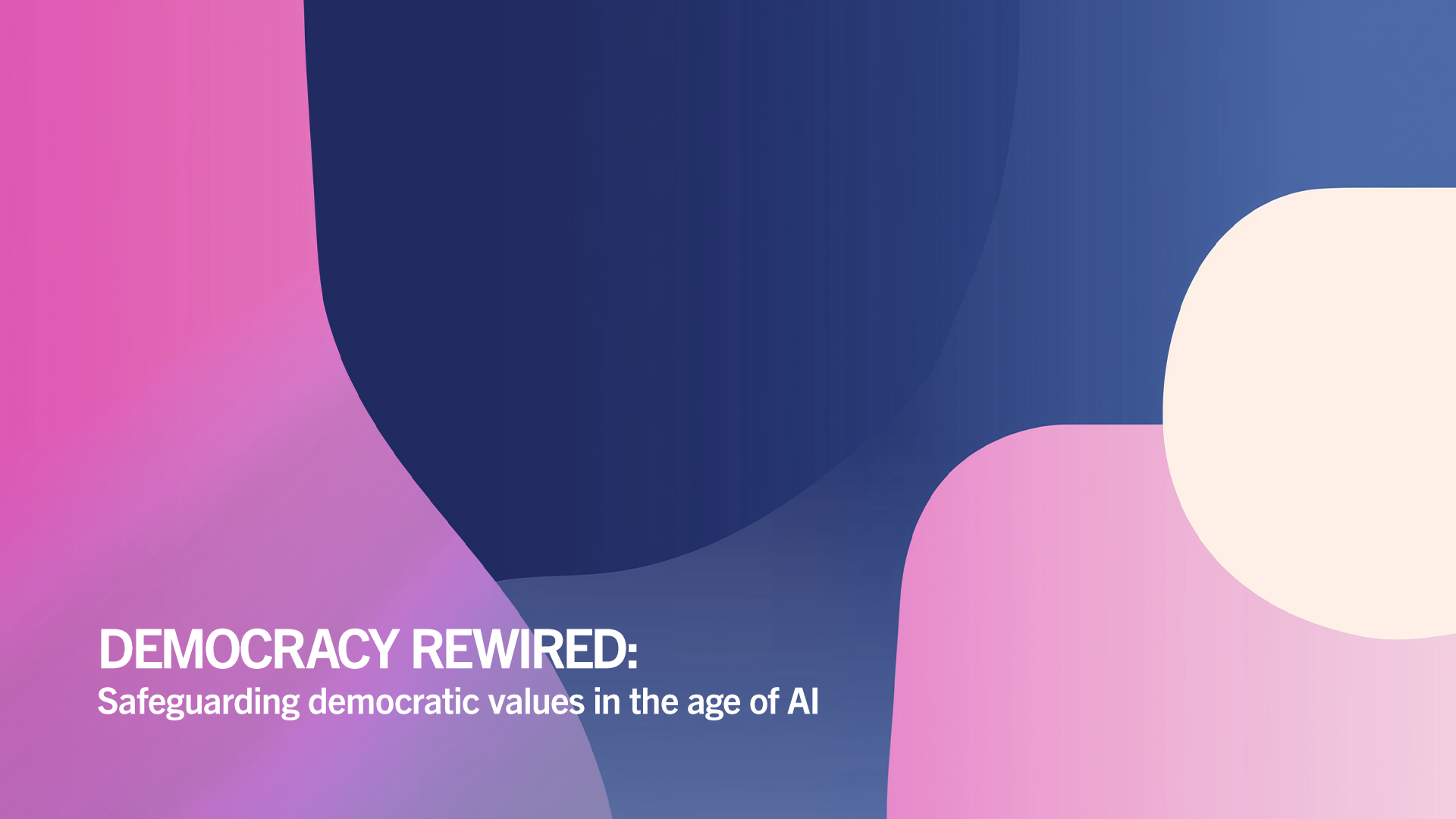WHAT’S HAPPENING
Here’s what we’re thinking about, talking about, and working on at the Schwartz Reisman Institute.
Democracy rewired: SRI essay series explores safeguarding democratic values in the age of AI
In a new essay series, the policy team at the Schwartz Reisman Institute for Technology and Society examines AI’s impact on the values underpinning democratic societies and governance. The series explores how AI, if left unchecked, may impact democracy – offering both an opportunity to reaffirm democratic values and critically assess the role of AI governance and regulation.
Future Votes: Safeguarding elections in the digital age
In October 2024, the SRI co-hosted a half-day event with The Dais and Rogers Cybersecure Catalyst to address election integrity, cyber security, and disinformation in the age of AI. The result was The Future Votes report, a reflection of key insights and recommendations for policymakers on how we can practically protect our democratic elections.
The smart way to run smart cities: New report explores data governance and trusted data sharing in Toronto
A new report from SRI Research Lead Beth Coleman, SRI Graduate Fellow Madison Mackley, and collaborators explores questions such as: How can we facilitate data-sharing across divisions to improve public policy and service delivery? What are the risks of data-sharing, how can we mitigate those risks, and what are the potential benefits of doing it right?
New SRI/PEARL survey now published, reveals worldwide public opinion about AI
A new report report shares findings on opinions about artificial intelligence (AI) in 21 countries. GPO-AI reveals varying, diverse and region-specific attitudes about the use of artificial intelligence, and topics of focus in the survey include job loss, deepfakes, and state regulation. The project was led by SRI Associate Director Peter Loewen, and features contributions from SRI Graduate Fellow Blake Lee-Whiting.
SRI/PEARL joint project explores global public opinion on AI with contributions to 2024 Stanford AI Index
The Stanford Institute for Human-Centered Artificial Intelligence (HAI) has released their 7th annual AI Index, and this year’s edition includes data from a joint project by SRI and the Policy, Elections and Representation Lab (PEARL) at the Munk School of Global Affairs & Public Policy. The Stanford Index is considered one of the most trusted and widely-read indices about the state of AI in the world.
Global group of experts advises on concrete steps towards a robust AI certification ecosystem
When new technologies enter the world, they must earn trust. How can we create trust in artificial intelligence? A new report from the Certification Working Group (CWG) explores the necessary elements of an ecosystem that can deliver effective certification to support AI that is responsible, trustworthy, ethical, and fair.
Rethinking AI regulation: CIFAR policy brief explores paths forward for regulating in a new world
What’s missing from current efforts to regulate artificial intelligence? SRI researchers author a new CIFAR AI Insights Policy Brief on bracing for large-scale economic, social, and legal change—and how policymakers can adapt governance infrastructure to an economy transformed by AI.
New SRI white paper explores AI regulation through existing financial consumer protections
A new white paper published by the Schwartz Reisman Institute explores how synergies between AI regulation and existing consumer protection principles can be leveraged to ensure policy-makers do not need to start from scratch when it comes to developing governance for the use of AI in financial services.
Discerning signal from noise: New SRI report explores insights from the state of global AI standardization
In a new report published by the Standards Council of Canada, the Schwartz Reisman Institute surveyed the global landscape of AI standards to identify key areas to leverage standards for AI assurance.
New report explores opportunities and challenges for AI innovation in financial services
How can we harness the economic benefits of AI innovation? In June 2022, the Schwartz Reisman Institute convened a roundtable with the Business Development Bank of Canada to explore how AI can be better used in financial services, featuring panelists from financial institutions, leading startups, universities, and government. The event’s findings have been issued in a new report that details the importance of responsible AI and new approaches to regulation.
Algorithms in art and culture: New publication explores music in the age of AI
How are algorithms influencing the production and consumption of culture? A new white paper on AI, music recommendation, and cultural consumption released by the Schwartz Reisman Institute argues their impacts are profound and far-reaching.
Harnessing commercial data for public good: can it be done, should it be done—and how?
A proposed new tool aims to aggregate commercial data to enable a safe re-opening of Toronto’s Financial District. But the project raises questions around usability and privacy, as well as concerns about its value, risks, and feasibility. SRI reports on a Solutions Workshop with findings relevant to broader implications for data sharing and privacy.












